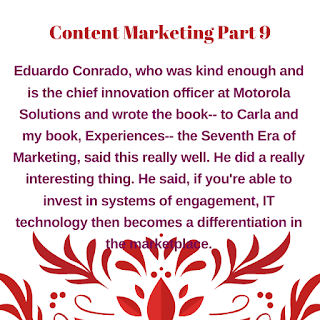Hi. Welcome to Module 2 of the Content Marketing Institute's University Master Class. Module 2 here is getting to a strategic function. How do we actually start to think about a function of content marketing before we think about its form? And what I want to do there is I want to start by thinking, what holds us back. What is it that actually holds us back from using content more effectively in the business and especially for marketing purposes? And so, let's think about that for a second.
We know that marketing is not getting any easier. So studies have recently shown that half of us, or half of the consumers, really switched services because of some poor customer experience. And I don't mean poor customer service. I mean a poor customer experience.
As I like to say, customer service is what happens when the customer experience breaks down. Half of the individuals-- consumers-- switched services. Think about how quickly now you change out your cellphone company or change out a service because you had a bad experience on their website, or you had a bad experience in their physical experience.
We have a mandate now to create powerful customer experiences that add value to the products and services we offer. 23% of us-- only 23% of us-- feel like we have any relationship with any brand at all. Think about that for a second. Think about when you open up your refrigerator, right. You open up your refrigerator, and you look at all the different brands that are in your refrigerator.
Or you open up the Start menu on your computer and you look at all the brands that are represented there. Think about when was the last time you went to any one of their Facebook pages and just wrote, you know what guys, I think you're doing a terrific job. You don't do that.
You might engage with their content, though. And quite frankly, interestingly, 75&% of studies have shown of adults would prefer that, quite frankly, their data isn't used at all.
So using data and extracting data from customers is only going to become more complex, not less so. Marketing is going to get more complicated, more complex. And share of experience is the new goal. There's a wonderful study being done by the Association of National Advertisers, the ANA, called Marketing 2020, where they're going across the globe, in looking at all the different ways that marketing organizations are changing, from a functional standpoint, from the way that people organize marketing, from people, process, teams, all those kinds of things.
One of the things that they found in studying brands that actually are forward-leaning and that really get it versus those brands that are lagging, are those that really get it are helping enhance their customer experiences by delivering content-driven customer experiences. And the ones that are really forward-leaning are personalizing those experiences.
As they say, the most important marketing metric will soon shift from a share of wallet to share the experience. This is something that we're seeing in just all kinds of ways at the Content Marketing Institute and what we see with brands. This share of experience, the share of attention that we're getting from consumers, is really much more important than trying to grab their attention and persuade them to do something in time. And we marketers, quite frankly, we're making it up as we go.
It's really true. 94% of us feel like optimizing the digital content experiences that we have would be a great thing. It would provide higher engagement, more conversions, better leads. But only 3% of us say that we have really the existing technology, processes, and teams to be able to do that.
97%-- almost all of us-- would see a dramatic increase in the breadth of skills needed. We're all doing things that we never did before. We're all signing up for Snapchat.
We're all signing up for Meerkat and Periscope and all these things, trying to understand these new platforms and how our consumers will behave with them, and trying to figure out all these things that we've never had to do before. 97% of us are doing things that we've never done before and seen the increase in the breadth that we need to deliver those things.
So marketing is getting more complicated. The patterns of marketing are changing. The question is, can we change the patterns. Can we actually change ourselves, not just the technologies that support it? So it's starting to happen, right.










No comments:
Post a Comment